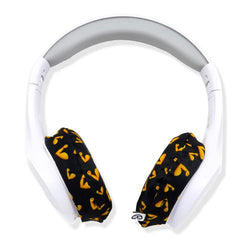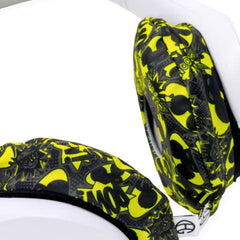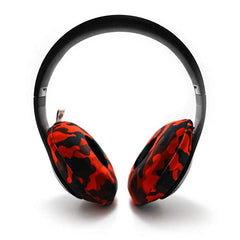Can Headphones Cause Vertigo?

More of us are wearing our headphones for longer. We’re wearing them to relax, to play games, to study, and to travel. We might wear them in an open-plan office or during a lengthy commute. You could be an audiophile plugged into a stereo system or maybe you’re addicted to audiobooks and podcasts.
The popularity of headphones and earbuds has meant an increase in people reporting strange sensations after wearing them. Earbuds make some people nauseous. Active noise-cancelling leaves others feeling a strange pressure in their heads. We’ve written about the risks of wearing wireless headphones before. Others believe headphones can cause vertigo.
But are some people just more sensitive to these things? Motion sickness for example doesn’t affect everyone.
But there is a growing number of people reporting these strange sensations and whilst anecdotal evidence doesn’t always stack up, being aware of the potential downsides to regular headphone use is important. Can headphones cause vertigo or is it just a coincidence?
What is vertigo?
Vertigo is caused by a problem in the inner ear. Our inner ear is connected to balance. When you have vertigo, your balance is off and you’ll experience dizziness. One website describes it as feeling as though the world is spinning in circles around you.
According to the NHS, vertigo can be caused by migraines, infection or inflammation; it might also be a symptom of a rare condition called Ménière's disease. Vertigo can appear without any known cause but often disappears on its own.
Can headphones cause vertigo?
It’s believed that headphones can cause vertigo. Listening to music at high volume can damage the inner ear which makes it harder for the ear to regulate balance.
Loud noises can increase pressure in the ear canal making it more likely you’ll experience a spinning sensation.
Certain sounds can also cause vertigo. Researchers at the University of Utah found that around 1 in 100 people has ‘a congenital inner ear condition… a thinning of the bone enclosing the inner ear that can lead to vertigo in response to certain sounds.’ There are specific tones that will cause the ear to send the wrong message to the brain saying the head is rotating when it’s not. Your eyes will react to that incorrect information and counter-rotate making it feel as if you’re spinning.
Noise-cancelling headphones have been known to cause dizziness, too. Allie Volpe writes that the inner ear affects hearing and balance so it makes sense that when noise-cancelling is switched on and begins messing with auditory input that it will contribute to a sense of disorientation.
Noise-cancellation alters the way we listen to sound and that can have a jarring effect on our balance. The post goes on to say that some people may be more sensitive to the effects of noise-cancelling headphones if they already experience motion sickness or general dizziness.
Countless people enjoy wearing noise-cancelling headphones without issue but a quick internet search will highlight that for some people headphones do seem to cause bouts of dizziness. Anecdotal evidence isn’t enough to prove that headphones are the cause but it’s interesting that some scientific studies have revealed a potential connection. In 2011, the American Journal of Otolaryngology published details of a case where a woman developed severe vertigo after wearing noise-cancelling headphones for 12-hours straight. They conclude that it’s the first ‘reported association’ between vertigo and headphone use.
Reducing the Risk of Vertigo When Wearing Headphones
We wear our headphones daily. We even wear them during exercise (with our moisture-resistant headphone covers, obviously), so it’s concerning to think that we’re at risk of feeling dizzy or disorientated.
There are a few things you can try to help reduce the risk of dizziness next time.
- Take regular breaks from wearing headphones. This isn’t ideal advice for people who wear them constantly but it’s not just about reducing the risk of experiencing vertigo but also about your hearing. Hearing loss through headphone use has even been flagged by the World Health Organisation as a serious threat to public health.
- For the same reason, keep the volume at a safe level. It’s recommended that you listen at no higher than 60% of the maximum volume.
- Try using open-back headphones so that some ambient noise can filter through. This will help the inner ear interpret information and send better messages to the brain.
- If you suffer from motion sickness or are sensitive to pressure change, it’s worth avoiding active noise-cancelling headphones or at least being aware that using it could exacerbate symptoms.
If you’re worried about dizziness, contact a healthcare professional.
Headphone covers won’t protect you from vertigo, but they will keep moisture from damaging the cushions. This is especially important if you’re exercising in them. Check out the range of designs in our store. Sign up to our mailing list for a 10% discount and be the first to know when a new range drops.





